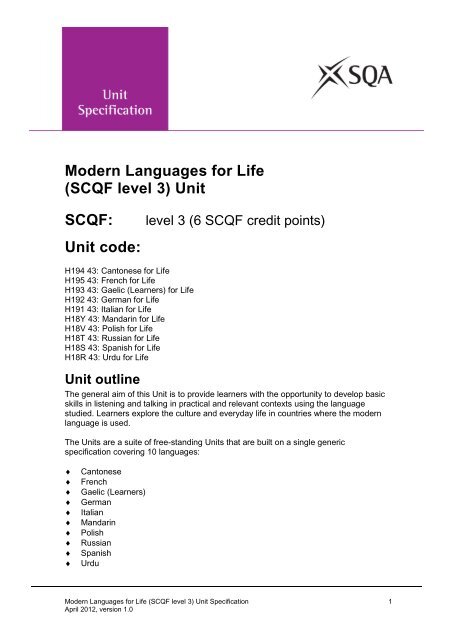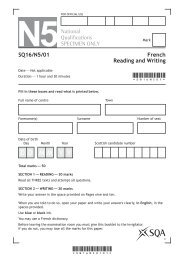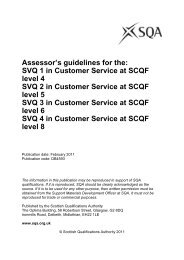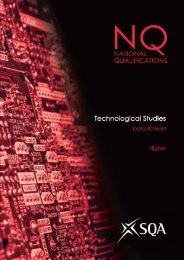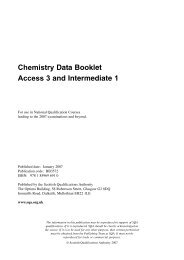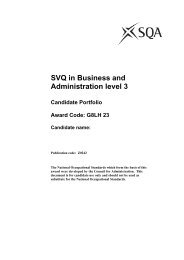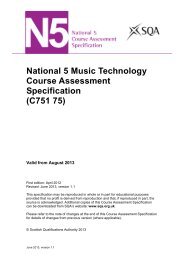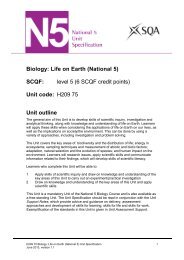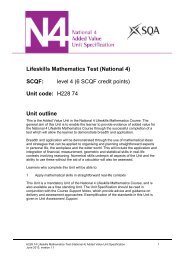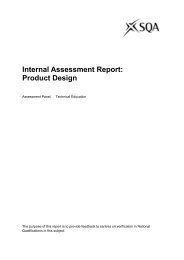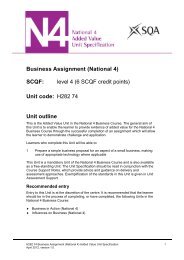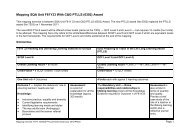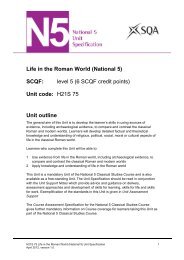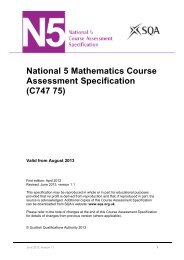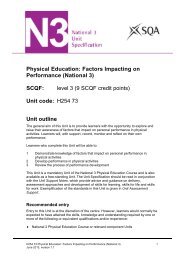Modern Languages for Life (SCQF level 3) Unit SCQF: Unit ... - SQA
Modern Languages for Life (SCQF level 3) Unit SCQF: Unit ... - SQA
Modern Languages for Life (SCQF level 3) Unit SCQF: Unit ... - SQA
You also want an ePaper? Increase the reach of your titles
YUMPU automatically turns print PDFs into web optimized ePapers that Google loves.
<strong>Modern</strong> <strong>Languages</strong> <strong>for</strong> <strong>Life</strong><br />
(<strong>SCQF</strong> <strong>level</strong> 3) <strong>Unit</strong><br />
<strong>SCQF</strong>:<br />
<strong>Unit</strong> code:<br />
<strong>level</strong> 3 (6 <strong>SCQF</strong> credit points)<br />
H194 43: Cantonese <strong>for</strong> <strong>Life</strong><br />
H195 43: French <strong>for</strong> <strong>Life</strong><br />
H193 43: Gaelic (Learners) <strong>for</strong> <strong>Life</strong><br />
H192 43: German <strong>for</strong> <strong>Life</strong><br />
H191 43: Italian <strong>for</strong> <strong>Life</strong><br />
H18Y 43: Mandarin <strong>for</strong> <strong>Life</strong><br />
H18V 43: Polish <strong>for</strong> <strong>Life</strong><br />
H18T 43: Russian <strong>for</strong> <strong>Life</strong><br />
H18S 43: Spanish <strong>for</strong> <strong>Life</strong><br />
H18R 43: Urdu <strong>for</strong> <strong>Life</strong><br />
<strong>Unit</strong> outline<br />
The general aim of this <strong>Unit</strong> is to provide learners with the opportunity to develop basic<br />
skills in listening and talking in practical and relevant contexts using the language<br />
studied. Learners explore the culture and everyday life in countries where the modern<br />
language is used.<br />
The <strong>Unit</strong>s are a suite of free-standing <strong>Unit</strong>s that are built on a single generic<br />
specification covering 10 languages:<br />
<br />
<br />
<br />
<br />
<br />
<br />
<br />
<br />
<br />
<br />
Cantonese<br />
French<br />
Gaelic (Learners)<br />
German<br />
Italian<br />
Mandarin<br />
Polish<br />
Russian<br />
Spanish<br />
Urdu<br />
<strong>Modern</strong> <strong>Languages</strong> <strong>for</strong> <strong>Life</strong> (<strong>SCQF</strong> <strong>level</strong> 3) <strong>Unit</strong> Specification 1<br />
April 2012, version 1.0
Learners who complete this <strong>Unit</strong> will be able to:<br />
1 Take part in simple conversations related to culture and everyday life in the<br />
modern language<br />
2 Understand simple language related to culture and everyday life spoken in the<br />
modern language<br />
This <strong>Unit</strong> is a mandatory <strong>Unit</strong> of the <strong>Modern</strong> <strong>Languages</strong> <strong>for</strong> <strong>Life</strong> and Work Award<br />
(<strong>SCQF</strong> <strong>level</strong> 3) and is also available as a free-standing <strong>Unit</strong>. The <strong>Unit</strong> Specification<br />
should be read in conjunction with the <strong>Unit</strong> Support Notes, which provides advice and<br />
guidance on delivery, assessment approaches and development of skills <strong>for</strong> learning,<br />
skills <strong>for</strong> life, and skills <strong>for</strong> work. Exemplification of the standards in this <strong>Unit</strong> is given in<br />
the National Assessment Resource.<br />
Recommended entry<br />
Entry to this <strong>Unit</strong> is at the discretion of the centre.<br />
In terms of prior learning and experience, relevant experiences and outcomes may also<br />
provide an appropriate basis <strong>for</strong> doing this <strong>Unit</strong>. Further in<strong>for</strong>mation on relevant<br />
experiences and outcomes will be given in the <strong>Unit</strong> Support Notes.<br />
Equality and inclusion<br />
This <strong>Unit</strong> Specification has been designed to ensure that there are no unnecessary<br />
barriers to learning or assessment. The individual needs of learners should be taken<br />
into account when planning learning experiences, selecting assessment methods, or<br />
considering alternative evidence. For further in<strong>for</strong>mation please refer to the <strong>Unit</strong><br />
Support Notes.<br />
<strong>Modern</strong> <strong>Languages</strong> <strong>for</strong> <strong>Life</strong> (<strong>SCQF</strong> <strong>level</strong> 3) <strong>Unit</strong> Specification 2<br />
April 2012, version 1.0
Standards<br />
Outcomes and assessment standards<br />
Outcome 1<br />
The learner will:<br />
1 Take part in simple conversations in the modern language related to culture<br />
and everyday life by:<br />
1.1 Beginning and concluding the conversations<br />
1.2 Responding appropriately to requests <strong>for</strong> in<strong>for</strong>mation<br />
1.3 Asking relevant questions<br />
1.4 Using structures and vocabulary appropriate to purpose<br />
1.5 Demonstrating sufficiently accurate pronunciation to convey meaning to a<br />
sympathetic listener<br />
Outcome 2<br />
The learner will:<br />
2 Understand simple spoken language in the modern language related to<br />
culture and everyday life by:<br />
2.1 Identifying correctly the main points<br />
2.2 Identifying correctly points of detail<br />
Evidence Requirements <strong>for</strong> the <strong>Unit</strong><br />
Assessors should use their professional judgement, subject knowledge and<br />
experience, and understanding of their learners, to determine the most appropriate<br />
ways to generate evidence and the conditions and contexts in which they are used.<br />
For this <strong>Unit</strong>, learners will be required to provide evidence of their listening and talking<br />
skills by:<br />
<br />
<br />
taking part in at least one simple conversation in the modern language related to<br />
culture and everyday life<br />
understanding at least one simple spoken activity in the modern language related<br />
to culture and everyday life<br />
Evidence <strong>for</strong> the two Outcomes could be gathered in combination.<br />
Exemplification of assessment will be provided in the National Assessment Resource.<br />
Advice and guidance on possible approaches to assessment is provided in the <strong>Unit</strong><br />
Support Notes.<br />
<strong>Modern</strong> <strong>Languages</strong> <strong>for</strong> <strong>Life</strong> (<strong>SCQF</strong> <strong>level</strong> 3) <strong>Unit</strong> Specification 3<br />
April 2012, version 1.0
Development of skills <strong>for</strong> learning, skills <strong>for</strong> life,<br />
and skills <strong>for</strong> work<br />
It is expected that learners will also develop broad, generic skills through this <strong>Unit</strong>. The<br />
skills that are likely to be appropriate <strong>for</strong> this <strong>Unit</strong> are based on <strong>SQA</strong>’s Skills<br />
Framework: Skills <strong>for</strong> Learning, Skills <strong>for</strong> <strong>Life</strong> and Skills <strong>for</strong> Work and drawn from the<br />
main skills areas listed below. These must be built into the <strong>Unit</strong> where there are<br />
appropriate opportunities.<br />
4 Employability, enterprise, and citizenship<br />
4.6 Citizenship<br />
5 Thinking skills<br />
5.3 Applying<br />
Amplification of these is given in <strong>SQA</strong>’s Skills Framework: Skills <strong>for</strong> Learning, Skills <strong>for</strong><br />
<strong>Life</strong> and Skills <strong>for</strong> Work and its associated guidance Skills <strong>for</strong> Learning, Skills <strong>for</strong> <strong>Life</strong><br />
and Skills <strong>for</strong> Work: Using the Curriculum Tool. The <strong>level</strong> of these skills should be at<br />
the same <strong>SCQF</strong> <strong>level</strong> of the <strong>Unit</strong> and be consistent with the <strong>SCQF</strong> <strong>level</strong> descriptor.<br />
Further in<strong>for</strong>mation on building in skills <strong>for</strong> learning, skills <strong>for</strong> life, and skills <strong>for</strong> work is<br />
given in the <strong>Unit</strong> Support Notes.<br />
<strong>Modern</strong> <strong>Languages</strong> <strong>for</strong> <strong>Life</strong> (<strong>SCQF</strong> <strong>level</strong> 3) <strong>Unit</strong> Specification 4<br />
April 2012, version 1.0
Administrative in<strong>for</strong>mation<br />
Published: April 2012 (version 1.0)<br />
Superclass:<br />
to be advised<br />
History of changes to Award <strong>Unit</strong> Specification<br />
Version Description of change Authorised by Date<br />
© Scottish Qualifications Authority 2012<br />
This specification may be reproduced in whole or in part <strong>for</strong> educational purposes<br />
provided that no profit is derived from reproduction and that, if reproduced in part, the<br />
source is acknowledged. Additional copies of this <strong>Unit</strong> can be downloaded from <strong>SQA</strong>’s<br />
website at www.sqa.org.uk.<br />
Note: readers are advised to check <strong>SQA</strong>’s website: www.sqa.org.uk to ensure they are<br />
using the most up-to-date version of the <strong>Unit</strong> Specification.<br />
<strong>Modern</strong> <strong>Languages</strong> <strong>for</strong> <strong>Life</strong> (<strong>SCQF</strong> <strong>level</strong> 3) <strong>Unit</strong> Specification 5<br />
April 2012, version 1.0


